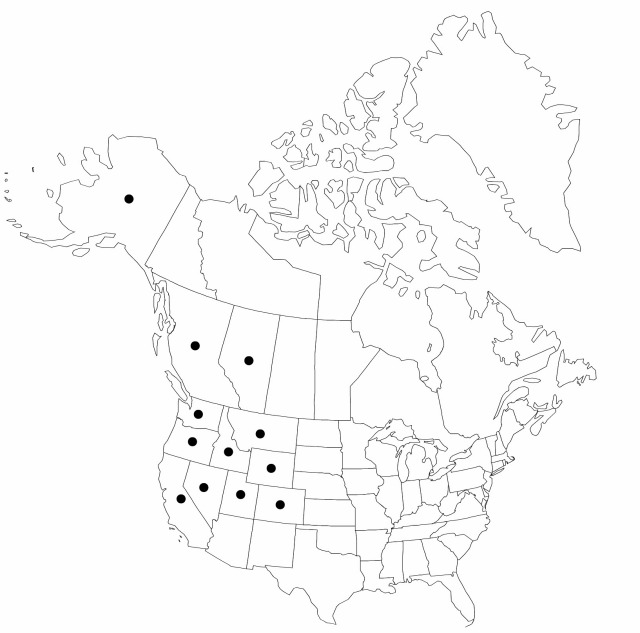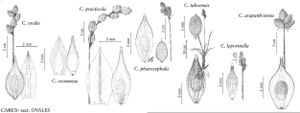Difference between revisions of "Carex phaeocephala"
Contr. U. S. Natl. Herb. 11: 172. 1906.
FNA>Volume Importer |
FNA>Volume Importer |
(No difference)
| |
Revision as of 21:09, 16 December 2019
Plants densely cespitose. Culms (5–)15–45 cm. Leaves: sheaths adaxially white-hyaline, summits U-shaped or rounded, often prolonged to 2.5(–3) mm beyond collar; distal ligules 1.5–2.5(–3) mm; blades 3–5 per fertile culm, often channeled, occasionally folded, becoming trigonous toward tip, 5–20 cm × 1–2.5(–3) mm, if not folded, margins revolute. Inflorescences usually dense, stiff, gold to brown or brown and green, 1.5–3.5(–4) cm × 10–15 mm; proximal internode 4–10 mm; 2d internode 2–5 mm; proximal bracts scalelike to bristlelike, shorter than inflorescences. Spikes (3–)4–7, distant, distinct, ovoid to broadly ovoid, 12–15 × 5.5–8 mm, base rounded to attenuate, apex acute to truncate. Pistillate scales gold or brown, usually with pale to green midstripe, lanceolate to ovate, 3.7–5.1 mm, usually ± equaling and covering perigynia, margin white-hyaline, 0.1–0.3 mm wide, apex acute to acuminate. Anthers early deciduous or short-persistent. Perigynia ascending, greenish or pale gold to brown, conspicuously (0–)4–9-veined abaxially, conspicuously 0(–4)-veined adaxially, narrowly ovate to broadly ovate, flat or plano-convex, 3.8–5.2 × 1.5–2.3 mm, 0.4–0.5 mm thick, margin flat, including wing 0.3–0.5 mm wide, ciliate-serulate at least on distal body, not crinkled, without glossy metallic sheen; beak brown to red-brown or gold with white-hyaline tip, cylindric, unwinged, ± entire for 0.6 mm, abaxial suture with conspicuous white margin, distance from beak tip to achene 1.8–2.2 mm. Achenes ovate to broadly ovate or, occasionally, elliptic, 1.5–2 × 0.8–1.1(–1.2) mm, 0.3–0.5 mm thick. 2n = 84.
Phenology: Fruiting summer.
Habitat: High-montane to alpine areas, usually rocky soils
Elevation: 1200–4000 m
Distribution

Alta., B.C., Alaska, Calif., Colo., Idaho, Mont., Nev., Oreg., Utah, Wash., Wyo.
Discussion
Reports of Carex phaeocephala from northern Canada are based on other species, mostly C. tahoensis.
Selected References
None.
